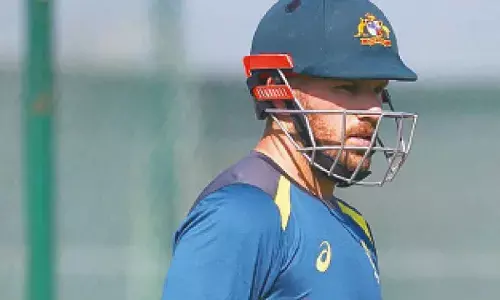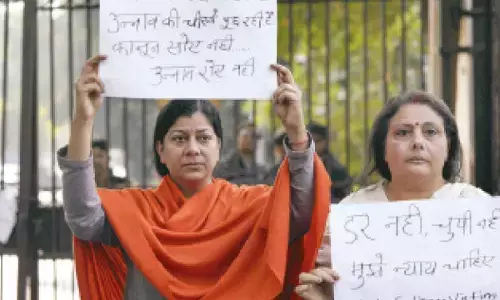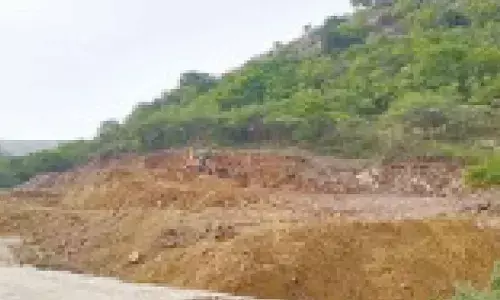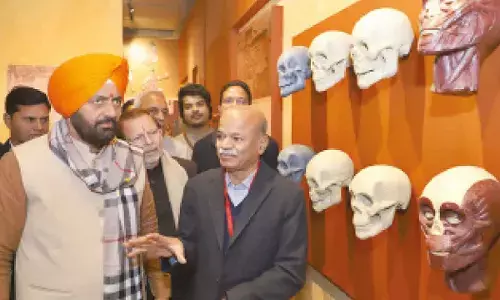Defunct in AP, inadequate in Telangana

The reading of Sections 7 and 19 of the RTI Act makes it clear that the RTI Act is a timebound legislation for effectively exercising the fundamental right to information guaranteed in Article 19 of the Constitution of India However, the CIC and SICs which are the final appellate authorities under the RTI Act,
The reading of Sections 7 and 19 of the RTI Act makes it clear that the RTI Act is a time-bound legislation for effectively exercising the fundamental right to information guaranteed in Article 19 of the Constitution of India. However, the CIC and SICs which are the final appellate authorities under the RTI Act, and are the guardians of the Act are taking many months, and in some cases even years, to decide appeals and complaints due to accumulation of pending appeals/complaints. The main cause for such a delay is large number of vacancies in SICs across India.
Anjali and other filed a PIL for a writ directing the State governments of Maharashtra, Gujarat, Andhra Pradesh, Nagaland, West Bengal, Kerala, Karnataka, Odisha and Telangana to take immediate steps to appoint Chief State Information Commissioners and Information Commissioners of the respective SICs in a transparent and time bound manner.
On 15th February 2019, the Supreme Court Division Bench consisting of AK Sikree and Abdul Nazeer directed the Centre and State governments to fill up vacancies in time bound manner and be transparent in the selection process. The Supreme Court pointed out bias in selecting only bureaucrats and instructed to select the persons from other fields prescribed in the RTI Act. It said any delay in filling up of vacancies will deny the timely access and frustrate the very right totally.
The Supreme Court reiterated that RTI is a fundamental right and if implemented as per RTI Act, it will usher in good governance. The SC examined the status of SICs in various states and found several vacancies. It directed the states to initiate measures to increase strength of the Commissions. The SC noted that SIC in AP is defunct for two years and in Telangana it is inadequate. AP was directed to appoint CIC and fill vacancies in three months and Telangana was asked to appoint four more Commissioners within six months.
In other States, Commissions are functioning without a Chief Information Commissioner thereby undermining the autonomy of the Commission and hampering its smooth functioning including its ability to comply with the directions of this court regarding the power of the Chief Information Commissioner to decide formation of special benches to hear matters involving complex questions of law.
In a PIL, the petitioners represented to the Supreme Court that by not filling up vacancies in Information Commissions in a timely manner, the Central and State governments are frustrating the very purpose of the RTI Act as receiving information in a time-bound manner is the essence of the law.
As per the submissions to the Supreme Court from various States, the position in SIC is: Karnataka -1 vacancy (appointment process is stayed), Maharashtra- 2 vacancies, West Bengal one Chief and Two SICs are appointed, Odisha- one SCIC and three SIC are working, Gujarat - 3 vacancies, Kerala - five vacancies (could not be filled because of litigation), Telangana – Chief and one SIC is working, Andhra Pradesh – no SCIC, three commissioners are recently appointed.
Only two in Telangana
It was stated that as on 23rd January 2019, 10,102 appeals and complaints were pending in Telangana. Their affidavit also discloses that between 23rd October 2017 to 23rd January 2019, 64.50% of the appeals/ complaints received were disposed of. A Chief Information Commissioner and State Information Commissioner have been appointed dated 15th September 2017.
The Supreme Court said that the composition of Telangana SIC with only SCIC and one Information Commissioner is too inadequate having regard to the pendency and also the number of cases which are filed on monthly/yearly basis. In the earlier affidavit filed by the State of Telangana on 6th September 2018, it was stated that as on 13th September 2017, when the Commission was constituted, there were a total of 6,825 pending cases.
This figure rose to 9341 on 30th June 2018 and as on 23rd January 2019, the pendency has increased to 10,102. If sufficient number of Information Commissioners are not appointed, the pendency will keep increasing and piling up.
The Supreme Court felt that for proper functioning of the Telangana SIC, there should be at least four more Information Commissioners appointed, for the time being and said this suggestion may be considered and decision in this behalf shall be taken by the State Government within one month and the newly created posts shall be filled up within six months from the date of this judgment.
Defunct since 2017 in Andhra Pradesh
In the State of Andhra Pradesh, the Commission became defunct in May 2017 after the retirement of serving Information Commissioners. In August 2017, the High Court of Judicature at Hyderabad directed that information Commissions be set up in Telangana and Andhra Pradesh. For over 10 months, people seeking information from public authorities under the jurisdiction of the AP SIC have had no recourse to the independent appellate mechanism and their right to information is violated.
On 24th August 2018, AP informed that three Commissioners were appointed. The affidavit further states that another notification was issued calling upon applications for filling up of the post of SCIC and remaining Information Commissioners. SC wondered: ‘It is also not understood as to why steps were not taken for filling up of the post of SCIC as the Chief, who is the head of the Commission, performs crucial role insofar as functions of the SIC is concerned.
….May be, with three Information Commissioners who have recently been appointed, AP SIC shall get activated, but to limited extent. However, that hardly serves the purpose and does not make the SIC fully functional.
The Supreme Court finally said: We, therefore, impress upon the State of Andhra Pradesh to fill up the post of SCIC and also the remaining posts of Information Commissioners at the earliest and in any case within three months from the date of this judgment. At least now the two governments should wake up.




















